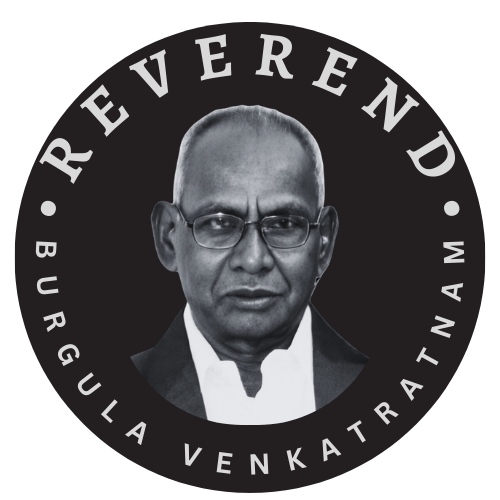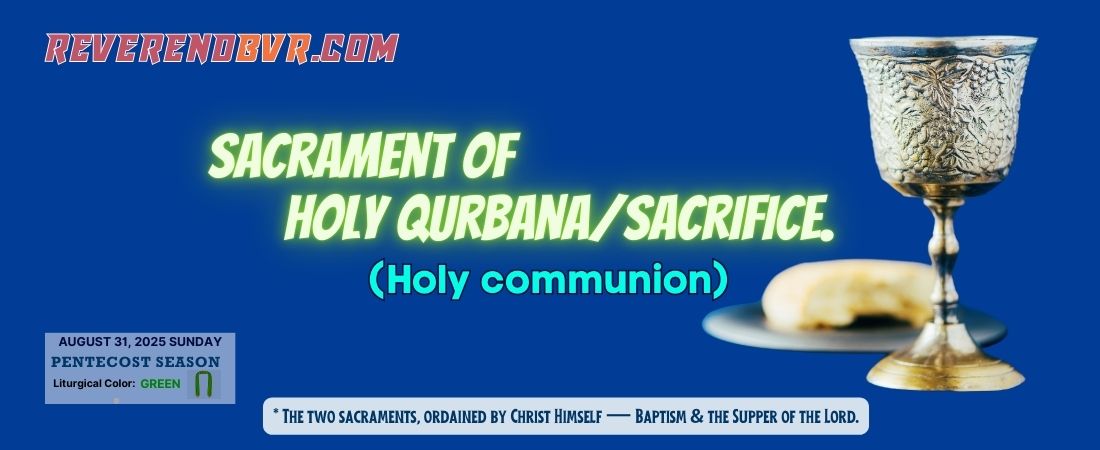The Sacrament of Holy Communion is more than a ritual remembrance; it is a profound participation in the life, death, and resurrection of Christ. As we “do this in remembrance of me” (Luke 22:19), we enter into a sacred mystery that unites us with the eternal covenant sealed by His blood, nourishing our faith with hope, unity, and a call to live sacrificially in the world.
Sermon Topic: The Sacrament of Holy Communion |“Do this in remembrance of me.” (Luke 22:19).
Date: August 31, 2025, Sunday.
Scripture Readings: Exodus 12:1–14; Psalm 42; 1 Corinthians 10:14–22; Luke 22:7–20
Original Language Reflections (For deeper study, see Section 2 in the sermon): Refer Table explaining Hebrew & Greek Words.
Website: www.reverendbvr.com
1.Introduction: Sacred Memory, Present Mystery, Future Hope
In a world fraught with uncertainty, the Sacrament of Holy Communion—also known as the Eucharist, the Lord’s Supper, or Qurbana (Aramaic: ܩܘܪܒܢܐ, qurbānā) —offers the Christian believer not only a remembrance of Christ’s death but a participation in His life. This is not a mere ritual, nor is it symbolic alone. It is a living act of worship, where the boundaries of time and space blur, and we are drawn into the eternal redemptive work of Christ. This message seeks to explore the Holy Communion from its Old Testament origins, its New Testament fulfillment, and its contemporary application, grounding our reflections in biblical exegesis, theological insight, and pastoral encouragement.
I. Historical Roots: Passover as Prototype (Exodus 12:1–14)
The Sacrament of Holy Communion finds its genesis in the Jewish Passover (פֶּסַח, Pesach). In Exodus 12, God institutes the Passover meal as a perpetual remembrance of His deliverance of Israel from Egypt. Each household was to sacrifice a lamb without blemish, smear its blood on the doorposts, and consume it in haste—ready for redemption.
This ritual had theological depth:
- Blood marked the homes of those who belonged to God (Ex. 12:13).
- The unleavened bread (מַצָּה, matzah) signified purity and haste.
- The bitter herbs (מָרוֹר, maror) symbolized suffering and bondage.
Importantly, this feast was exclusive to God’s covenant people (Ex. 12:43-51). It was not merely an ethnic ritual, but a theological act of remembrance, obedience, and identity formation.
Jesus, fully aware of this heritage, reinterprets the Passover in Himself during His last supper. He is the true Lamb of God (ἀμνὸς τοῦ θεοῦ, amnos tou Theou) (John 1:29), whose blood ensures ultimate deliverance—not from Egypt, but from sin and death (1 Cor. 5:7).
II. Fulfillment in Christ: The Last Supper (Luke 22:7–20)
Luke’s Gospel offers the most explicit eucharistic formula in the Synoptics: “This is my body given for you… This cup is the new covenant in my blood.” (Luke 22:19–20)
Here, Jesus does three key things:
- He gives thanks (Greek: eucharisteō, whence we derive “Eucharist”).
- He redefines the elements: bread (ἄρτος, artos) as His body, wine (οἶνος, oinos) as His blood.
- He establishes a command: “Do this in remembrance (ἀνάμνησις, anamnēsis) of me.”
Unlike the annual Jewish Passover, Jesus institutes a continual observance. The new covenant, foretold in Jeremiah 31:31-34, is now sealed by His blood. In this act, Christ transitions His followers from the shadows of the Old Covenant to the substance of the New.
III. Participation and Purity: Holy Communion in the Early Church (1 Corinthians 10:14–22)
Paul’s theology of Communion in 1 Corinthians 10 and 11 is strikingly profound. He asks rhetorically: “Is not the cup of thanksgiving… a participation (κοινωνία, koinōnia) in the blood of Christ? And is not the bread that we break a participation (κοινωνία, koinōnia) in the body of Christ?” (1 Cor. 10:16)
The Greek word koinōnia (“participation” or “fellowship”) signifies a mystical union. Communion is not only a remembrance but a real spiritual participation in the life of Christ and the unity of the Church:
- Unity: “Because there is one loaf, we, who are many, are one body…” (1 Cor. 10:17).
- Purity: Paul exhorts believers to examine themselves before partaking (1 Cor. 11:28).
- Separation from idolatry: You cannot drink the Lord’s cup and the cup of demons (1 Cor. 10:21).
Paul’s argument implies that the Eucharist binds us to Christ and to one another. It is inherently relational and ecclesial. It demands moral integrity, social justice, and spiritual discernment.
IV. Contemporary Meaning: Communion in the Life of the Church
1. A Meal of Memory and Mission: The Eucharist reminds us of Christ’s suffering and victory. But it is also a call to live cruciform lives, shaped by self-giving love, humility, and justice. The early Church practiced the breaking of bread with gladness and sincerity of heart (Acts 2:46), sharing all things in common (Acts 2:44–45).
2. An Act of Worship and Witness: As we eat and drink, we proclaim the Lord’s death until He comes (1 Cor. 11:26). Communion becomes a sacrament of hope, rooted in the past, effective in the present, and anticipating the future.
3. A Call to Unity and Repentance: In a fragmented world—politically, socially, economically—the table of the Lord challenges us to embrace one another across barriers. It also invites deep self-examination. Have I forgiven my brother? Have I honored Christ with my body? Am I walking in love?
V. Theological Dimensions: Sacrament, Offering, and Fellowship
- Sacrament (Latin: sacramentum, oath): A visible sign of invisible grace.
- Offering (קָרְבָּן, qorbān in Hebrew; ܩܘܪܒܢܐ, qurbānā in Aramaic): An offering/A gift or sacrifice dedicated to God. Christ is both high priest (ἀρχιερεύς, archiereus) and sacrifice (θυσία, thysia).
- Mass (Latin: missa, from mittere, “to send”): Communion ends with a sending/ commissioning—Go, live what you have received.
- Fellowship (κοινωνία, koinōnia) — Not merely community, but intimate participation and shared life in Christ.
As Oxford’s theologian Wycliffe once said, the Eucharist is “the Gospel in bread and wine.”
VI. Application: How Shall We Then Live?
- Participate Regularly and Reverently – This is not a tradition to observe passively but a mystery to enter actively (Psalm 42:2).
- Examine Yourself Honestly – Are you harboring sin or disunity? Seek reconciliation (1 Cor. 11:28).
- Live Eucharistically – Let your life be broken and poured out for others as Christ was for you (Rom. 12:1).
- Hope Expectantly – Christ is coming again. Let the table be a foretaste of the wedding feast of the Lamb (Rev. 19:6–9).
VII. Names for Holy Communion : Throughout Christian history and across traditions, the Sacrament has been known by different names
- Eucharist – Thanksgiving (Greek: εὐχαριστία, eucharistia)
- The Lord’s Supper – A covenant meal instituted by Christ
- Holy Communion – Participation in Christ’s body and blood
- Qurbana – Offering (Syriac/Aramaic)
- Mass – Sending (Latin: missa)
- Divine Liturgy – The public service of worship (Eastern Orthodox)
- Breaking of Bread – Simplicity and fellowship (Acts 2:42)
VIII. Conclusion: The Table as an Invitation
Every time we partake in the Lord’s Supper, we step into a divine drama. It’s not just about remembering Jesus’ death; it’s about living into His life, becoming His body in the world, and longing for His return. This meal forms our identity, shapes our character, and fuels our mission.
2.Learn Words from the Original Scriptures (For deeper understanding and meditation on today’s theme)
| S.No | Original Word ( Click on each term to view its lexical details) | Transliteration | English Term | Language |
| 1 | פֶּסַח | Pesach | Passover | Hebrew |
| 2 | מַצָּה | Matzah | Unleavened Bread | Hebrew |
| 3 | מָרוֹר | Maror | Bitter Herbs | Hebrew |
| 4 | ἀμνὸς τοῦ θεοῦ | Amnos tou Theou | Lamb of God | Greek |
| 5 | εὐχαριστία | Eucharistia | Eucharist | Greek |
| 6 | κοινωνία | Koinōnia | Participation | Greek |
| 7 | θυσία | Thysia | Sacrifice | Greek |
| 8 | ἀρχιερεύς | Archiereus | High Priest | Greek |
| 9 | ἀνάμνησις | Anamnēsis | Remembrance | Greek |
| 10 | ἄρτος | Artos | Bread | Greek |
| 11 | οἶνος | Oinos | Wine | Greek |
| 12 | ܩܘܪܒܢܐ (korban) | Qurbānā | Offering (Qurbana) | Aramaic (via Greek) |
| 13 | μυστήριον | Mystērion | Mystery | Greek |
Bibliography
- The Holy Bible, New International Version (NIV).
- Wright, N.T. The Meal Jesus Gave Us. Westminster John Knox, 2013.
- Brant Pitre, Jesus and the Jewish Roots of the Eucharist, Image, 2016.
- Calvin, John. Institutes of the Christian Religion, Book IV.
- Moltmann, Jürgen. The Church in the Power of the Spirit. SCM Press, 1977.
- Oxford Bible Commentary. Edited by John Barton and John Muddiman, OUP, 2001.
- McGrath, Alister. Christian Theology: An Introduction, Wiley-Blackwell, 2016.
Closing Prayer
Gracious Father, We thank You for the gift of Your Son, Jesus Christ, the true Passover Lamb. As we come to Your table, fill us with awe and humility. Cleanse our hearts, bind us together in love, and nourish us with the bread of heaven. Let this Holy Communion not only remind us of the Cross but empower us to carry it daily. May we live in Your presence, serve one another in love, and proclaim Your death until You return in glory. Through Christ our Lord, Amen.
Let the Church continue to break bread together, until we feast with Him in the kingdom that has no end.
© 2025 ReverendBVR.com | High-Academic Sermon Series, 2025.
Content licensed under Creative Commons Attribution-NonCommercial-NoDerivatives 4.0 International (CC BY-NC-ND 4.0). You are free to share — copy and redistribute the material in any medium or format with proper attribution. No commercial use or modifications allowed without explicit permission.
For further sermons and biblical reflections, please visit 🌐 www.reverendbvr.com/sermons

